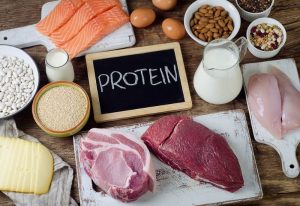Now that they are backed up by solid scientific evidence, those old adages concerning the foundations of good health – a good night’s sleep and a healthy diet – are returning to the forefront in modern health thinking. With that in mind, it should come as no surprise to learn that numerous studies have linked diet to sleep quality. There is a growing body of evidence indicating that what you eat can impact the quality of your sleep. But what are the best foods for sleep? Choosing your foods wisely can help you to improve your sleep, making an important contribution to better overall health and well-being.
Go High Protein
 A 2020 review of 19 studies found that diets that were higher in protein and lower in carbohydrates and fats were associated with better sleep quality. A 2016 study offered similar results, finding that people that ate more protein and fiber and less saturated fat, sugar and carbohydrates enjoyed better sleep and spent more of their sleeping time in restorative deep sleep than did people eating a less healthy diet.
A 2020 review of 19 studies found that diets that were higher in protein and lower in carbohydrates and fats were associated with better sleep quality. A 2016 study offered similar results, finding that people that ate more protein and fiber and less saturated fat, sugar and carbohydrates enjoyed better sleep and spent more of their sleeping time in restorative deep sleep than did people eating a less healthy diet.
Eating high protein foods like poultry, fish, eggs, nuts, broccoli and spinach can help increase feelings of satiety and are rich in nutrients that promote good sleep. Protein foods, such as turkey, eggs and milk, provide an amino acid essential to good sleep, tryptophan, which is used in the production of the hormone melatonin.
Think Melatonin
While the hormone melatonin performs many functions within the body, it is most commonly known for its role in promoting good sleep. There are a variety of foods that have melatonin or provide nutrients that promote melatonin production. These are firmly among the best foods for sleep. Milk, as do many melatonin containing foods, falls into both categories, offering both melatonin and nutrients that promote melatonin production in the body.
Because melatonin levels start to rise as daylight wanes and evening begins, increasing as it becomes darker, the milk from evening milked cows has more melatonin than the milk that comes from morning milking, though morning milk also has melatonin. Those with dairy cows or goats may want to set aside some of the evening milk to use for a nice cup of warm milk an hour or so before bed. Add a touch of honey and a splash of real vanilla for a special sleep-enhancing treat. Honey helps reduce the level of the alertness, promoting the neurotransmitter orexin in the brain, and aromatic vanilla can help you to relax.
An evening meal that includes fatty fish, such as salmon or tuna, and rice may help you to sleep better because both the fish and the rice have melatonin. Other foods rich in melatonin include tart cherries, mushrooms, bananas, oatmeal, corn and goji berries. Other than the goji berries and the tart cherries, each of those foods also has tryptophan, which is essential to melatonin production in the body. While the tart cherries don’t have tryptophan, they do have procyanidin, which enhances tryptophan availability in the body.
Employ Strategic Nutrition
Promote good sleep with targeted nutrition. Fatty fish also offers omega-3 fatty acids, vitamin D, vitamin B6 and magnesium. All of those nutrients have a role in promoting better sleep via aiding in melatonin production, serotonin release timing and, in the case of magnesium, muscle relaxation.
Interestingly, many people dealing with insomnia also have low levels of magnesium. Magnesium-rich foods include cashews, avocados, spinach, brown rice and bananas. Bananas are also a great source of potassium, another muscle-relaxing, good-sleep-promoting nutrient. Other good foods for potassium are potatoes, legumes, dark leafy greens and mushrooms.
Consume Natural Fiber
Eating a high fiber diet is associated with more deep, restorative sleep. Even just a single day of failing to eat enough fiber can have a negative impact on sleep quality, a shocking concept in light of the fact that a mere 7 percent of American adults eat enough fiber in their daily diet.
For better sleep and better overall health, include plenty of healthy, high-fiber foods in your diet via a variety of fresh fruits, vegetables and whole grains. Excellent sources of fiber include beans, nuts, berries, pears and whole grains, like oats and brown rice. Aim for 14 grams of fiber for every 1,000 calories you consume each day.
The Best Foods for Sleep Are Real Foods

The Mediterranean Diet offers an excellent model of healthy, well balanced eating that promotes sleep quality and overall health and well-being. Another thing to keep in mind when planning a diet for better sleep is meal timing. For a more restful night, eat your evening meal about three hours before bedtime, so that the bulk of digestion has taken place before you’re settling in to go to sleep.







